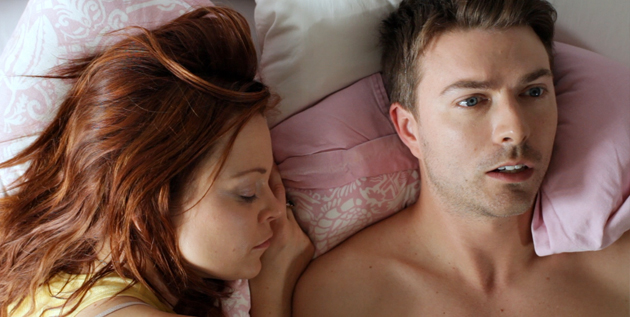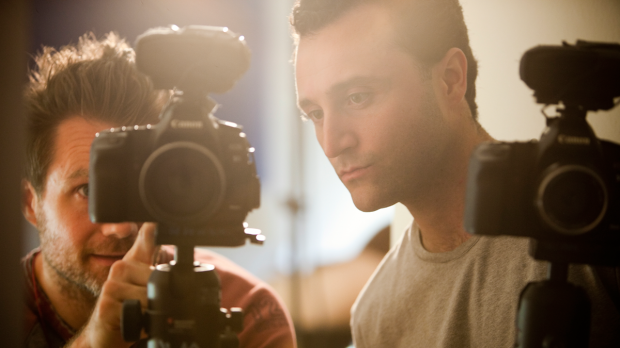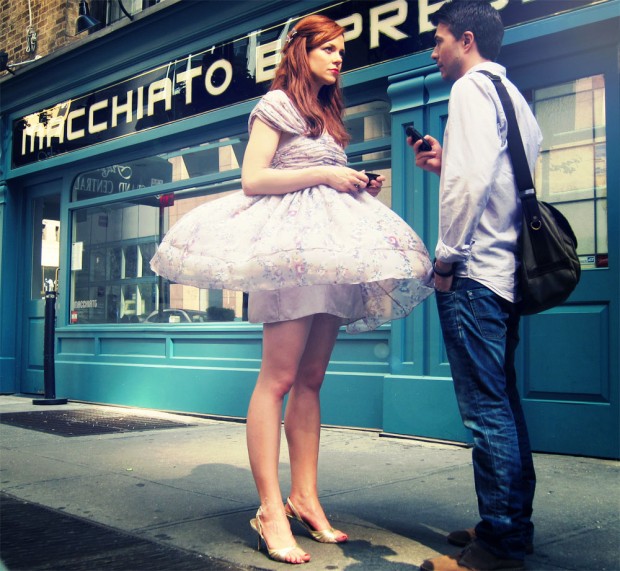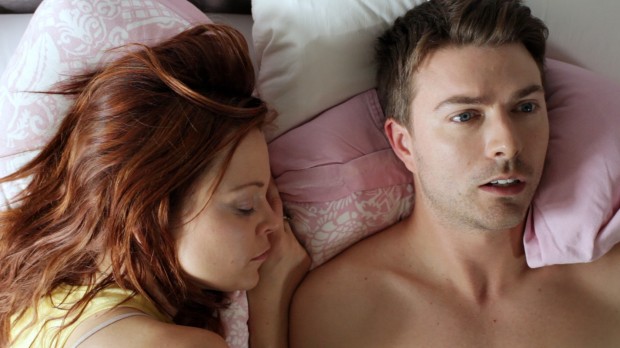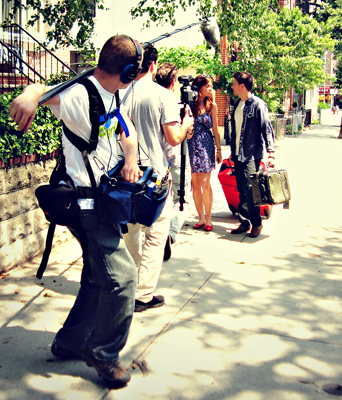For some, making their first feature is a long and drawn out process, featuring years and years of meticulous screenplay editing, an arduous casting process, another year in post, all to beget a film that is as personal as a hermetically-sealed bag. JC Khoury, the writer/director of The Pill didn’t have time for that. Mixing personal aspirations with game shows, he came up with the idea for his debut feature and gave himself a ticking clock before he had to put it all on film.
The ticking clock idea translates directly into The Pill where a one night stand could quickly turn into a life-long problem if not for these two little miracle pills (my review). In this extended interview, discover the films that helped shape this frank and funny little film, what line makes people yell at the screen in horror, whether or not it’s a good date flick, and the invaluable influence of Tiger Woods.
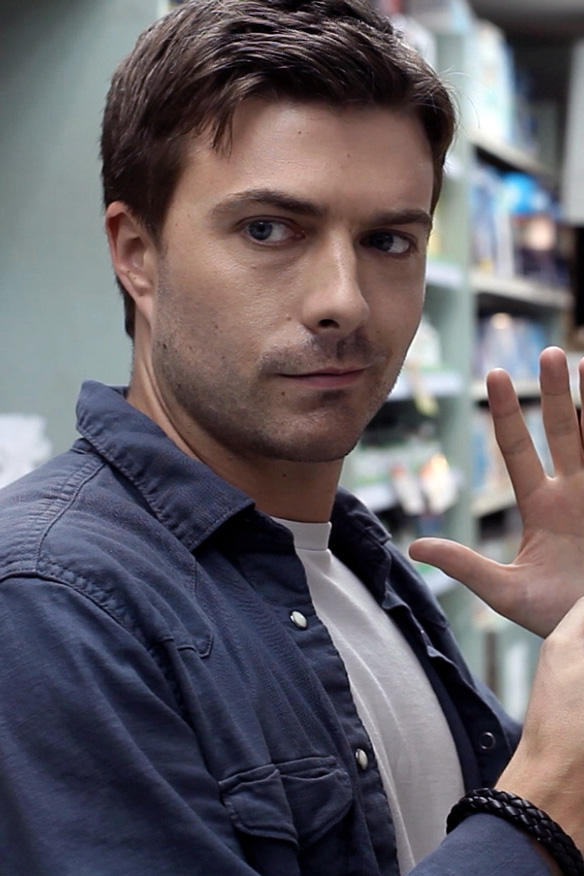 The Film Stage: Congratulations. This is your first feature film?
The Film Stage: Congratulations. This is your first feature film?
JC Khoury: Yeah, it is.
How did you come up with the idea for The Pill? Was it a personal story, because–
–There was some personal stuff.
Usually when it’s a writer creating a character who’s a writer, you sorta get the hint.
I was in a relationship, condom broke. Being a professional hypochondriac I’m like, “alright, you’re pregnant, it’s over. Done.” She’s like, “relax,” [but] I was very neurotic. We went to get [the pill] and the pharmacist says, “it’s two pills.” And I was like, “two pills?” He said, “yeah, one now, one twelve hours later.” That’s when I realized [this] great little device that hadn’t been used before to keep two people together [over] a short span of time. Obviously if you trust the person you’re with that it’s not that big of a deal, but if you didn’t, then it becomes the glue, the engine that drives the whole [movie].
I was looking for a movie that could be done simply. Two people, minimal locations, but I think a lot of those movies that are done that way lose steam, they don’t have an engine driving it. There’s just not enough holding it together. And I wanted to make sure it had a device that could do that.
There are a few ticking clocks that go on, besides that one. Was it hard to balance all that, or would you consider it a good thing? Having more conflict than less conflict.
I think more conflict is always a good thing, as long as it kind of builds organically on top of each other. You want to keep tightening the screws. Keep dropping Fred (Noah Bean) in crazier situations, always making him feel like he has to make a choice under pressure. Stick with the girl to make sure she takes that second pill, but wait, she’s driving me nuts, making me feel uncomfortable, dropping me in all of these weird, awkward situations. I think that was the key, keeping the stakes as high as possible.
Especially for that character. He seems as if he doesn’t make a lot of choices, or doesn’t like to make them on on his own. Especially when you see him with his current girlfriend.
Absolutely. Mindy (Rachel Boston) takes Fred out of his comfort zone. He would never have a day like that if he hadn’t been pushed into it. Just like you said, normally he’s the one being pushed around.
You started the script off with a small idea. Was the goal to always do something in a smaller concept?
Yes.
Was it a budget concern as well?
Absolutely. I actually set a date to make the film the moment I had the idea. I was just like, “I’m making this film in July.” I’m making this movie my way. I’m not going to turn it into a producing exercise. I’m going to keep the budget low, keep it manageable, and focus on story and performance.
How long did it take, from conception through completion? Or at least through shooting.
Coming up with the idea through actual shooting was…seven months, maybe? Seven months.
How did that feel, especially as a writer/director? Was that the right amount of time to get pushed against the wall and make this happen?
Yeah, it was good. It felt good. After waiting a long, long time for other projects to come together, it was good to feel that I could do something quickly, efficiently. If the script wasn’t working, I wasn’t going to go ahead. But I knew that I had a concept that I was confident enough to write. And once I started showing the script to actors and I got the feedback that I was hoping for, then I knew, “alright, let’s do this, let’s go for it.” (laughs)
Did you have a cast beforehand? Were you writing in people for parts?
I had Noah in mind because I had worked with him before. And when he came in and auditioned I was sure, 100%, that he was the guy. He came in to audition with a full beard, [so I said] “you look like a Civil War general.” A full beard. But I thought, “nah, he can still do it, I’m sure he’ll the same guy when we shave the beard.”
(laughs) Just parting the whiskers to try and find the character underneath.
(laughs) Exactly. And then Rachel read the script and she actually approached me, which was great. Then Anna Chlumsky was great, we auditioned her. I thought she’d be perfect for Nellie. It was mostly an audition process. I used this casting director, Lindsay Chag out of L.A. It was just about looking at submissions and then auditioning.
I think auditioning is so important. I don’t like looking at tapes. I want to see the person in the room and interact with them. Get to know them a little bit. The whole “sending the tape” thing, it’s kind of weird, I don’t know.
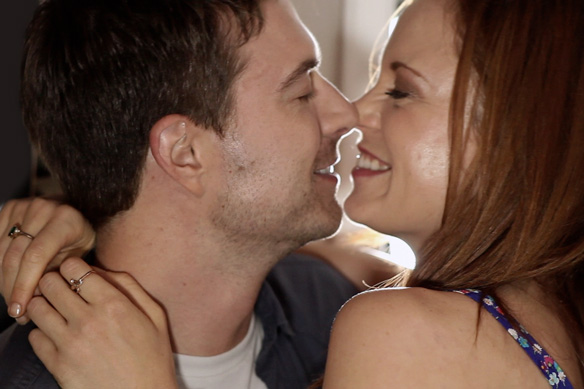 Especially on this kind of project as well. With the lower budget, you all had to really work together to get this done.
Especially on this kind of project as well. With the lower budget, you all had to really work together to get this done.
Absolutely. It was a team effort. The whole shoot was fifteen days of principal photography, with two extra days of just MOS [“mit out sound,” no sync audio] running around the city, just grabbing stuff. We were shooting seven pages a day, [essentially] a TV shoot…using the Canon 5-D. Great camera. We had two of them. My DP, Andreas von Scheele operated the A camera and I operated the B camera, so we almost always had two cameras going simultaneously. And that was a tremendous help, too. Just get more done.
How was that process for you as a director?
It was great. I love holding the camera as well. I mean, I like having someone else take care of the lighting, but I love operating a camera. You need to be there. I think a lot of directors think that they need to be ten feet away in video village, looking the other direction. That’s terrible. You want to be right there. I’d rather even look at the actor than look at the monitor.
Did you come from a background of just film, because the opening feels very theatrical, almost like a chamber play. Especially the first twenty minutes or so which is all self-contained in that apartment. Was that an idea you came to this story with?
Yeah, absolutely. I wanted it to start out just like a play. I’d been watching a lot of films like Rope and Tape where the whole film takes place in one location, and they work. So I thought, “alright, I could probably do twenty minutes in one location.” (laughs) I could do 20%, y’know? I love plays. I’ve never directed one but I love going to the theatre. It was a good test. If the acting is good and I’m just focusing on the story and the performance, then I don’t think people will mind that it’s only taking part in one apartment for most of the first act.
How much of that was improv, how much of that was written?
Fifteen to twenty per cent was improv. There was definitely an improv element. And I encouraged the actors, I really wanted them to say it in their own words if that’s what would keep them in the moment, and keep them [active], and keep it fresh, then go for it. I’m not precious with my words. I’m precious [with] my structure, but if you want to come up with some new stuff, great. Do that, I’m all for that. The worst thing I think you can do with a film is get stuck and make it wooden or laborious. You want to keep it fresh and alive and spontaneous, so anything you can do to do that, I’m for.
How much of the script was a game of what to reveal and how much to keep hidden? We never learn how the two met, even though they’re asked many times throughout. Was that a conscious choice to keep it as up in the air as possible?
I think so. I knew as I was writing the script, who cares how they met? All that matters is he’s in this situation, he has to make a choice, does he stay or does he go? How they met? Eh, we can fill in the blanks. A bar, a party…whatever. All we know is that Fred obviously went out Han Solo, you know what I mean? He put a condom in his pocket before he left, we know that, when he reaches into his own pants to get the inciting [prophylactic].
Which leads to a great line when the girlfriend is counting condoms. “Who counts condoms?”
(laughs) “Who the fuck counts condoms?” But people do. Everything in this movie is based off something I’ve experienced, or observed, or I heard first hand from friends who had experienced it. I really tried to make this as real and truthful as possible.
To a certain extent I’m sorry to hear about that. But it does come across. There’s a nice tonal balance between sort of standardized comedic situations and grounded emotional beats.
It’s funny you bring that up because I always saw this movie as a dramedy, a relationship dramedy, but now everyone says, “oh, you made a great romantic comedy.” I did? (laughs)
I’d say so. I’ll be one of those guys?
Really? I mean, I guess it is. It is. But, again, I didn’t write it like that. The movies I was looking at before I made this were Two Days In Paris, The Puffy Chair, Before Sunrise, those kinds of movies that I wouldn’t necessarily put in the “romantic comedy” category–Humpday. But they do balance that drama and comedy, which is what I wanted to do. So many Hollywood movies have a lack of verisimilitude. They’re just phoney. These broad Hollywood comedies and people live in these 4,000 square foot lofts and they’re a waiter, and it’s not real. I just wanted to keep the element of truth very much alive and there. But also, y’know, have it be a little elevated and obviously have a little fun with it.
The scene that balances that together the best is that sort of Fellini-esque dinner with Mindy’s parents. They’re French and weird and all of a sudden it turns Cassavetes. Suddenly all of this truth comes flying out, just throwing daggers at each other. Was that something that you thought about during the directing of it, making sure the balance is struck?
I think that when I wrote it, and I saw it all in my head when I wrote it…. That scene, funny enough, I just started writing and it just came out. I knew I had to have that sort of scene, but a lot of the dialogue was just the first pass. That’s just how it came out. I wanted it to be one of these families that just speaks their minds, and Fred is us, he’s the outsider who’s like “whoa, whooaa,” a little shocked by all that’s going on. But you’re a product of your environment, so by the end of that scene, he starts to side with Mindy. It shows that everything is relative. Mindy, who was maybe a little kooky, a bit too hot to handle before now becomes the element that he knows best, and they start to circle the wagons against the other elements of the family who are a little more…pernicious, if you will.
 That scene sets in motion the audience wanting Mindy to get with Fred. How hard is it then to introduce the original girlfriend and keep her relevant, when we’re already on the side of Mindy?
That scene sets in motion the audience wanting Mindy to get with Fred. How hard is it then to introduce the original girlfriend and keep her relevant, when we’re already on the side of Mindy?
I think you’re right. I think you start to realize maybe Fred and Mindy would be good together during the family scene, but I also wanted to raise the stakes. He has to be somewhere else, he has other things to take care of, all that juggling. Nellie’s character is the closest to being the villain, although I didn’t want there to be “villains” or “heroes,” they’re just people. But when you see her, and then you go back to seeing Mindy, it’s a breath of fresh air. “Oh, thank god he’s back with Mindy and not with Nellie.” That Nellie character is based off the wives of two friends of mine, who are living in hell.
And are their spouses aware of this fact?
Yeah. They’re just so beaten down. It’s funny, cause some people tell me, “oh that’s ridiculous, it’s not like that.” No it is like that. I’ve seen it first hand. Some relationships are like that. The apartment’s sterile, she’s a little bossy, there’s less give-and-take and more take on one end. It’s just what it is.
You sort of put Fred in between. As the movie goes forward I change my opinion on Fred. I thought he was an anal, sort of on-his-game kind of guy but when you see him with Nellie, it’s almost as if he’s been conditioned that way. You mentioned how people adapt to their environments. How much of this change is Fred getting pulled away towards more of what he is with Mindy than the character on his own? And how hard is that to convey in a movie?
That’s something where you have to see the whole movie and you go back and you realize, “oh wow. Maybe if Fred had stayed with Nellie, he would become–fully–a rigid, anal guy who may never write that great novel or make that great piece of art because he’s been conditioned in that sterile, corporate environment. Mindy again is that thing that pushes out of his comfort zone but, in doing that, lets him tap into his creative, helps him become the person he wants to become. Mindy’s this kind of magnet that’s trying to pull him away from the darkness.
I liked how not everyone is a good person, especially with Fred. He seems like kind of a scum bag. He just constantly lies and doesn’t seem to realize the problem with this. Besides the charming performance, was there a worry that the character could go one way or the other?
As long as Fred did what he had to do to keep the boat stable, and he never did anything outrageously bad, I knew it’d be okay. I knew that Noah is charming and he’d give a great performance and ultimately Fred does the right thing…. If this was a studio movie, right off the bat, “he’s not likable enough, we have to like him.” Really? In every movie you have to like the character from page one? Why not allow the audience the time to figure it out on their own and vacillate a little bit and let them make up their own minds, then lead them to a higher place in the end. It was a risk, but I was willing to take it because the payoff would be better that way.
You know, the typical Hollywood formula: beat up the character in the first twenty minutes, have the boyfriend or the girlfriend dump him or her, have them lose their job and then aww, we feel so sorry for him or her and then we’re with them through the movie. Sure, and that’s tried and true and has been done a thousand times. Look at Bridesmaids. Kristen Wiig is dumped on for the first twenty minutes so we’re with her ’til the end. “My god! What a poor, poor girl! I want to reach out and pet her and shelter her and take her back to my home!”
Where in this movie, yeah, it’s not like that. Right off the bat, the main character is telling some little lies to get by, to do what he has to. In the end, does that make him bad, or does that make him human?
Throughout the movie there are a lot of subtext and different uses of communication, specifically calling versus texting. Was exploring the levels of communication something you brought into this film?
Yeah, absolutely. I feel like everyone’s texting more now. That whole Tiger Woods had happened before I wrote the script and I remember how the wife picked up Woods’ phone and ended up texting one of the girls, pretending she was Tiger and I thought that was funny, why don’t I use that?
So we can thank Tiger Woods.
He had some input in this movie! (laughs)
How difficult was it for you to figure out how much information goes across? We learn as the characters learn. We figure out who these people are, especially in the opening, based off of how they figure out each other.
I wanted us to experience things as the characters experience it. I didn’t want to telegraph anything. We learn with him. We see the condom in the trashcan with him. We also see him texting someone when he’s in the bathroom. In the first act, we’re kind of behind. But later on, we’re ahead of the characters a lot of the time. We’re _way_ ahead of Mindy, and we’re way ahead of Nellie. It was good to kind of balance that out to let the audience experience [it]. It can all be engaging, dramatic irony or when you’re completely in the dark, so I wanted to have a mix of all those things.
I played a lot with [whether] Nelly should be a complete surprise, or if there should be hints going on, and I decided on the hints. But I’d say half the people who watch the movie, when Nelly shows up, it’s a complete surprise.
Oh man, I guess some people are more honest than others. I knew “that dude’s cheating” immediately. As soon as Mindy first calls him on it and he deflects.
Exactly! The first line of the movie practically is “you’ve got a girlfriend.” Now anyone who’s movie savvy says, “okay, this is where the movie is going.” But a lot of people, even with that line, even with texting someone in the bathroom, even with him looking at a flight itinerary, they tell me, “I was so shocked half way through and we meet the second women.” And I’m like, “really?” (laughs)
I didn’t want to make it this big thing. This is what happens in the real world. People are in flux; they’re in beginning of relationships, they’re in the end of relationships. It was a bit of a risk, too, but I think it all turned out okay, that the balance turned out well.
The movie has a documentary feel to it, which isn’t what I would immediately think of for this story, and that the camera switches from objective to subjective, like when Fred first goes into Mindy’s bathroom and sees all the clutter around the sink. You know exactly who that women is. Was that a conscious choice or a limitation of time?
It was just the easiest way to get inside of Fred’s head. Okay, he’s in the bathroom, what is he seeing? Boom, okay. We get it. I don’t think there were many POV shots like that in the movie but it organically felt like the right thing to do. I didn’t think too much, I just did it.
Do you think that helped overall, that you just did it?
Yeah, I think so. There was a bit of planning. We did a week of rehearsals, then I went out with my interns and assistants and went to all of the locations and did a rough blocking [with still photographs] just to figure out where to put the camera, what are the possible angles. That was me, my DP, and two assistants, with them standing in as the actors and us kind of shooting different possible angles off where the actors could possibly be. Not that I wanted to block for the actors, but to get a feel for the location so when we were actually shooting, we were more comfortable.
It wasn’t totally [that we] showed up and just started shooting. We locations, we had rehearsals, so you get out all the nerves, all the doubts so you can just focus on getting the good performance.
During that week of rehearsals, was there anything that surprised you or changed the script in some way?
Not really. There were doubts that got wrinkled out. Rachel was like, “oh, I don’t know, would I have a condom in the waste basket?” Noah and I were like, “yes, of course you would. It doesn’t make you a bad person because you had sex with someone else.” In real life, people have doubts. “Oh my god, I had sex with someone else. Can my character do that? Will people like me?” They’re human beings, stuck in these situations, and they’re not making evil choices. They’re making choices that are best for them in that moment in time. And as long as we stuck to that, we could be truthful to the script and make an honest, good romantic comedy. But it was a risk for all of us.
It’s funny because I had a meeting in L.A. with an executive, and he’s like, “well, if The Pill were to be remade, we have to cut out the fact that he has a girlfriend.” (laughs)
Exactly. I don’t think this movie can be made any way but the independent way. It’s not even that shocking, but it’s shocking enough.
Mindy didn’t know the day before that any of this was going to happen, so why would she feel bad?
Exactly. Why does that make her a bad person? It doesn’t. So what? Who cares? So she had sex with someone else last night. He had sex with someone else last night, too! It’s all relative.
The lies are sort of acceptable. If she says whose condom that was, then it all ends. And that’s not how it works.
And that’s not good, because she wants to hang out with him that night. And he can’t really blurt out that he’s at the tail end of his relationship because she’d say, “alright, I don’t want to get hurt.” So they all have to bend the truth a little bit to get what they want, but that’s reality.
And the last twenty minutes redeems him for the first part of the movie.
That’s why you vacillate. You’re with him, you’re against him, and by the end you come back around again.
I’m sure a studio would have loved the ending, too.
The very ambiguous ending. But there’s hope. Obviously there’s hope. She gives the number, they’re texting already, so it’s a hopeful ending, but yes, you’re right. I got notes from people who watched it [like] distributors who said, “no, you have to shoot one more scene, where they go running into each other’s arms!” And I’m like “what are you talking about? That’s terrible! Don’t you see what’s going on in the screen?” Why do we have to spoon feed people. Why don’t we let the audience piece together things in their mind instead of giving them everything up front.
The majority of the film happens over a twenty-four hour period with a bit of a cool down towards the ending, but it would seem completely inhuman for someone to just fall into another’s arms after that short of a time.
That’s exactly what I didn’t want to do. The trick is how do you keep it honest and entertaining? That was the goal for this film: keep it honest but also keep it entertaining. That was the biggest balancing act.
Was it always planned to keep it under those time constraints?
Yeah, unity of time, unity of place. Just keep it simple. Simple, simple, simple. I’d rather put restrictions on me and follow those restrictions and then out of that, in a way, I become more creative. As opposed to, “alright, let’s move to this location and add this character” and before you know it you’ve got this big mess. Restrictions are good for creativity, I think.
Is that something you’re going to continue with?
I think so. I’m going to try. (laughs)
If this is successful you might have a problem there. People will be offering money, ideas, keep you a bit looser, I guess.
Yeah, yeah. I’m okay growing out the world a little bit. Longer time span, more characters, more locations, as long as there’s some sort of hook or concept and one or two extreme characters I can hang it all on. I’ve already started working on the next script–
–What about?
I’m not sure if I want to divulge it all right now, but it’s in the same kind of milieu, another relationship comedy/dramedy. Again, it takes place with a handful of characters and there [are] some very awkward social situations. One in particular that is sort of explosive that drives the whole thing.
Is that the milieu you want to work in?
I think so. There’s so much to access! I mean, I love all kinds of movies, but when you’re doing a low budget, independent film, it’s easier to do this than it would be to mount some big space epic.
People don’t realize, when they say, “there need to be set pieces in a movie,” well there can also be emotional set pieces. Those can be just as explosive or big as a set piece with people running and things exploding and all that kind of stuff. Emotional set pieces could be just as crazy, and just as great.
Movies like The Break-Up, another great little movie. A lot of people don’t like it, a lot of people like it, very polarizing, but that whole movie takes place pretty much in one apartment and it’s got the energy to keep going. Or a movie like Cyrus, the Duplass brothers, also takes place in a small location, handful of characters, but there are some great scenes and great moments. I don’t think you have to make a movie huge to make it good. But again, some huge movies are great. Die Hard, Aliens, Raiders of the Lost Ark….
Outside of the reveal of the movie, have any other surprises happened as you’ve screened the film?
There’s usually some shouting back at the screen at the point when Mindy says, “because I wanted us to feel close.”
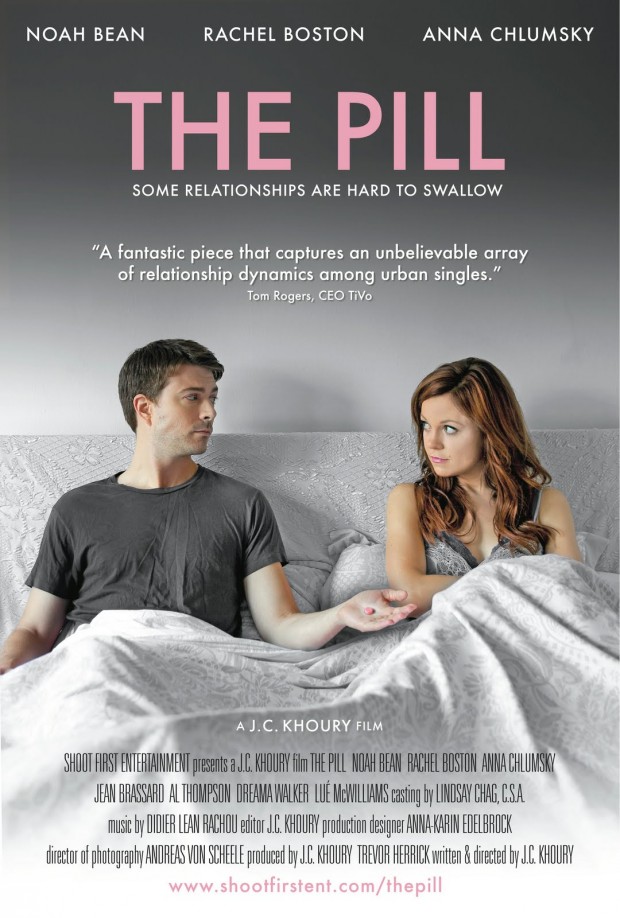
I did the same thing, actually.
People were screaming, outraged by that. But that happened to me. It’s something that happens, y’know? I feel like people think Mindy is just totally bonkers in the first act when really she’s just being Mindy. I don’t think she’s crazy, I just think she’s…in a weird, emotional state, a little bit lost, just trying to find someone that she can be with.
There were a few places where I buried my head in my hands because I’d been there, and it’s terrible, and there’s nothing you can do, and it’s just this horribly powerless feeling. And you have Fred, who doesn’t have power in either situation. One’s much more dire than the other.
Ian Gerard, the founder of the Gen Art Film Festival, said something interesting. “Jason, congratulations, you’ve made a great horror film.” I’m like, “thank you…I think.”
With Mindy, there’s a possibility of her falling too closely into the Nathan Rabin stereotype of the Manic Pixie Dream Girl. Was that a concern?
The trick with Mindy is that she drives the movie, and her spine is to rock the boat, and Fred’s spine is to keep the boat even keeled. That’s the whole movie. It’s that classic screwball set up, really. Of course she had to be a real person. We realize she’s been hurt, and she’s been in a bad spot, she’s emotionally weak. She needs a helping hand. But she also has so much energy, and she’s so full of life and has such a big heart. She’s a good person, a very good person.
Except for when she goes back to meet her roommate/ex-boyfriend, thing, which was weirdly powerful.
Jim, that’s Al Thompson, my buddy. He’s great. I wanted to drop Fred in these awkward social situations where he has to figure it out as the audience is figuring it out. [She asks], “hey, I have to pick up some stuff. Want to help me pick up some stuff?” And, “he was the roommate,” but she sort of left out some information. But, if she had said everything, would he really have come?
I like how she delineated it in her own mind. We weren’t really together as much as we were roommates and it just sort of escalated from there. They were at that level, added some things, then casually lopped it off.
Now they’re back to being roommates. Whatever happened, happened, and now you’re my old roommate and I gotta pick up my stuff. Oh, by the way, I’m here with the guy I just had a one night stand with. I kept trying to find the most tension, the most conflict. I tried to cherry pick those. I didn’t want to overstay my welcome, which is why I kept the movie pretty short, 83 minutes. I wanted it to always have forward momentum, I wanted it to move.
Was there a lot cut?
There actually was a bit cut. The original script was 99 pages. They stayed a lot longer at the diner [near the open], talked about themselves and who they are, their pet peeves, and it just wasn’t necessary. Who cares? I feel like I knew these people well enough by seeing their behavior. I don’t want to be told all this stuff. It was good for me to write so I learned who the characters were, but I didn’t need to share it with the audience.
I wish I had the perspicacity to go in and cut all that stuff in the writing stage, cause I could have shaved a day or two off the shooting schedule. I can see it after I shoot it, but not when it’s on the page. It’s hard.
How long did the editing process take?
Four months. Four months of actual, real editing.
There weren’t a lot of music cues in the film. Did you find music or did you know someone–
A guy I met, Didier Rachou, and he was great. He liked the movie, he’s like, “I’d like to score the movie,” and I said, “great. Let’s do this.” I didn’t want there to be…I mean some of these romantic comedies, it’s just wall to wall. It’s crazy. Dude, do we really need to be told how to feel every moment? He kept it very bare, simple, just when it was needed.
Were the montages always planned that way?
Yeah, I planned [for] there to be some moments where they warm up to each other. And of course it ends with shots of children.
Would you consider this a date movie?
It’s funny. Erik Davis [of movies.com] said this is the best possible date movie and the worst possible date movie all rolled into one. I think that’s a pretty good statement. Ultimately, I think it’s a date movie. If you’re with someone, and you’re in a relationship, then two people can watch this and laugh about it. If you’re on a first date…I don’t know what to say.
So what, we’ll say at three months you’re good?
Yeah, I think you’re safe. Actually, this is the movie they should show people on a first or second date, so you could weed [them] out.
The Pill is now available for rental on cable Video on Demand services on FilmBuff and available for purchase through iTunes.

